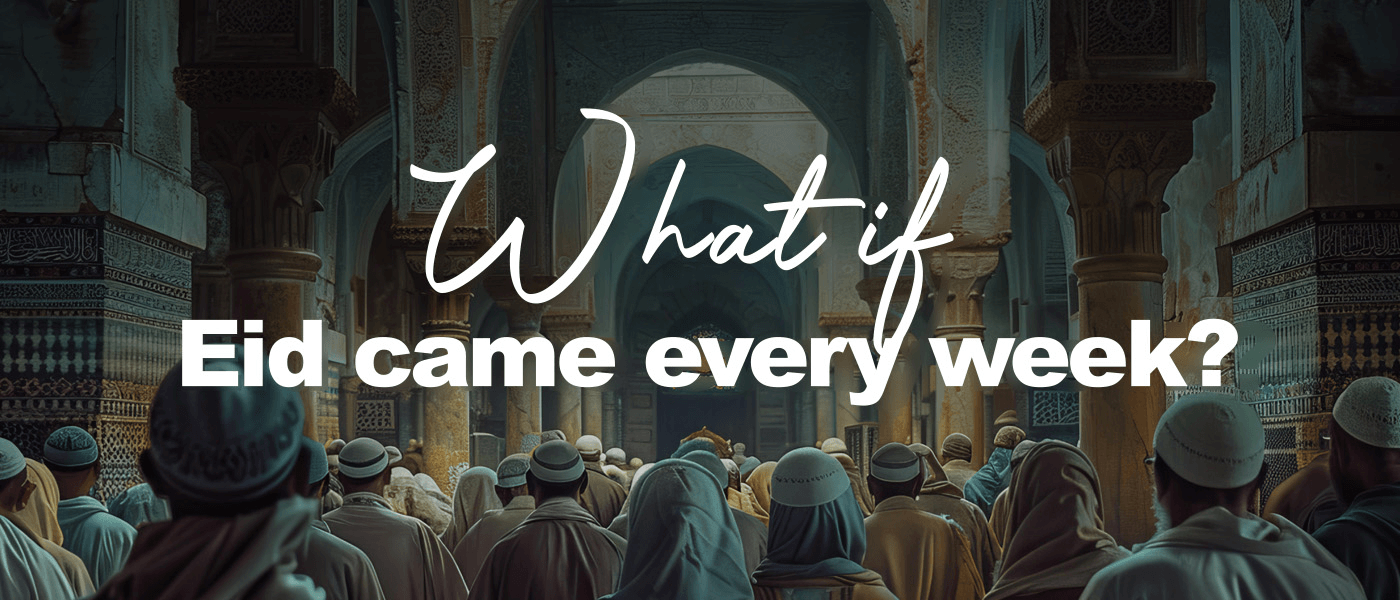
When we think of Eid, our minds often drift to the radiant mornings of Eid ul Fitr and Eid ul Adha – days filled with heartfelt prayers, dazzling outfits, warm family embraces, and tables overflowing with delicious food. These moments are etched into our memories as sacred celebrations of faith, unity, and gratitude.
But here’s a question that might surprise you: What if Allah (SWT) gave us another Eid – one that comes not once a year, but every single week? Would we recognize it? Would we honor it the same way?
Well, He (SWT) did. That weekly Eid is Jumu’ah, or Friday. And while many of us rush through it as just another workday or school day, the truth is far more profound. Jumu’ah isn’t just a midday prayer – it’s the most blessed day of the week, handpicked by Allah (SWT) for mercy, remembrance, and spiritual renewal. The Prophet Muhammad (SAW) even called it a day of Eid for the Muslim ummah.
So why is this weekly celebration so often overlooked? What makes Jumu’ah spiritually unique, and how can we reclaim its joy and significance in our lives?
In this article, we’ll uncover the hidden beauty of Jumu’ah, explore its divine purpose, and ask: What would our lives look like if we treated every Friday like Eid?
Jumu’ah is the day chosen by Allah (SWT)
The significance of Friday is that it is a day chosen and honored by Allah (SWT) Himself. In a famous hadith, the Prophet (SAW) is recorded to have said, “The best day the sun rises over is Friday. On it, Adam was created, on it he was admitted into Paradise, on it he was expelled from it, and the Hour will not be established except on a Friday.” (Sahih Muslim)
This narration reveals that Friday is tied to the most significant events in human history from the creation of mankind to the end of time. Unlike other religions that sanctified Saturday, such as the Jewish people, or Sunday, like the Christian people, Allah (SWT) gave Friday to the Muslims as a day of remembrance and gathering. In Surah Al-Jumu’ah, Allah (SWT) says, “O believers! When the call to prayer is made on Friday, then proceed diligently to the remembrance of Allah and leave off your business. That is best for you, if only you knew.” (The Clear Quran®, 62:9)
This verse makes it clear that Jumu’ah is not an ordinary day, it is a weekly divine appointment that believers are expected to honor.
Friday as the weekly Eid
The term “Eid” in Arabic means a “recurring celebration.” While we’re familiar with the two annual Eids, the weekly Eid of Jumu’ah is equally significant, if not more so. Ibn Abbas has narrated, “Friday is a day of Eid, so do not fast on it unless you fast a day before or after it.” (Sunan At-Tirmidhi) Just like Eid ul Fitr and Eid ul Adha, Jumu’ah is meant to be a day of joy, cleanliness, and spiritual connection. The Prophet (SAW) encouraged Muslims to bathe, wear clean clothes, apply fragrance, and arrive early for the Friday prayer. These are all markers of festivity and dignity.
Moreover, the communal aspect of Jumu’ah echoes that of Eid. We gather in large numbers at the masjid, listen to a khutbah, and pray together in unity. This weekly congregation strengthens not just our bond with Allah (SWT), but also with the wider Muslim community.
The spiritual and worldly benefits of Jumu’ah
Beyond its symbolic status, Jumu’ah is packed with spiritual rewards. The Prophet (SAW) was recorded in a hadith to have said, “There is a moment on Friday during which if a Muslim stands in prayer and asks Allah for something good, He will grant it.” (Sahih Muslim)
While scholars differ on the exact timing of this moment, many agree that it likely falls in the final hour before Maghrib. This makes Jumu’ah a golden opportunity for dua and introspection.
Additionally, attending Jumu’ah prayer serves as a weekly purification of sins. The Prophet (SAW) said, “Whoever performs ghusl on Friday, goes early to the mosque, listens attentively to the sermon, and refrains from idle speech, will have their sins forgiven between that Friday and the next, along with three extra days.” (Sahih Muslim)
This means that Jumu’ah acts as a spiritual reset button, offering a regular opportunity for repentance and renewal. Just as Eid marks the end of Ramadhan or the conclusion of Hajj, Jumu’ah renews our commitment to faith each week.
Reviving the barakah and rahmah of Jumu’ah in our lives
Given all of this, the question arises: Why do so many of us treat Jumu’ah as just another Friday?
Part of the answer lies in our fast-paced, secular routines. Work, school, and daily responsibilities often overshadow the spiritual value of the day. However, reclaiming Jumu’ah does not necessarily require dramatic changes, it begins with small, intentional steps:
- Prepare for it like you would for Eid. Take ghusl, wear your best clothes, and make the day feel special.
- Make time for the masjid, by attending the khutbah attentively and early, not rushed or distracted.
- Disconnect and reflect by reciting Surah Al-Kahf, give abundant salawaat on the Prophet (SAW), and take out time for dua.
- Create family traditions such as sharing meals, visiting relatives, or teach your children the significance of the day.
These simple efforts can transform Jumu’ah into a truly joyful and meaningful experience, a weekly source of light and strength in our lives.
This is a weekly gift that is not to be ignored
In a world where spirituality is often sidelined, Jumu’ah is a precious weekly reminder of our purpose and our connection with Allah (SWT). It is not a burden, but a blessing, a celebration, not a chore. It’s a weekly Eid given to this Ummah as a sign of Allah’s (SWT) mercy and preference for us.
Let us not ignore this gift. Instead, may we honor it, cherish it, and revive it in our hearts and homes every week, Ameen! For the believer, Friday is not the end of the work week, it is the spiritual peak of it.



